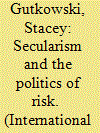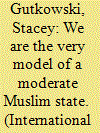|
|
|
Sort Order |
|
|
|
Items / Page
|
|
|
|
|
|
|
| Srl | Item |
| 1 |
ID:
109072


|
|
|
|
|
| Publication |
2011.
|
| Summary/Abstract |
Though British foreign policy toward Iraq was officially separate from counterterrorism strategy, ideas about the "global war on terror" circulated in both policy milieus. This article deploys the concept of the security imaginary, adding insights from Pierre Bourdieu's notion of the habitus, to explore why this was the case. The British security imaginary, as structured by a secular social landscape coming to terms with "radical Islamism," was beholden to a series of problematic assumptions about religio-politics. This article focuses on British perceptions of the Islamist Jaish al-Mehdi militia between 2003 and 2004. Beyond the Iraq example, this historical incident suggests intimate connections between the experience of domestic secularity and warfare.
|
|
|
|
|
|
|
|
|
|
|
|
|
|
|
|
| 2 |
ID:
188646


|
|
|
|
|
| Summary/Abstract |
Since 1948, Jordan has hosted successive waves of refugees from neighboring states. Since the onset of a new refugee crisis in 2011, the evolution of Jordan’s humanitarian assemblage has provided opportunities for the marked expansion, institutionalization, and globalization of Islamic and Christian humanitarianism within Jordan. The level of international influence the Jordanian government has allowed during the crisis has helped facilitate greater religious privacy for local Islamic and Christian charitable actors to express their religious vision through their charitable work with refugees. The regime has responded by allowing, surveilling, and sometimes seeking to reshape such religious effervescence in its own image. These dynamics cannot be understood purely through the history of refugee hosting in Jordan but also as ongoing competition between the regime and other actors, particularly Islamists affiliated to its main opposition Muslim Brotherhood, over dīn al-millah, or everyday religious expression.
|
|
|
|
|
|
|
|
|
|
|
|
|
|
|
|
| 3 |
ID:
108061


|
|
|
|
|
| Publication |
2011.
|
| Summary/Abstract |
Little has been said in the international relations (IR) literature so far about the connections between secular ideas and identification of risk. However, there are striking parallels. 'Western', secular discourse(s) have framed Islamist terrorism as slippery, uncontainable, mysterious and strange. Similarly, risks are often described as 'diverse, amorphous and qualitative'. Starting from this observation, this article explores connections between ongoing conversations about the politics of risk and insights from the emerging literature on secularism and international politics. Using the British 'Prevent' agenda of 2005-09 as a case study, it asks how it is that political secularism and cultural secularity have contributed to perceptions of danger emanating from the Muslim population. It explores the potential implications of these perceptions for state security policy. The article also explores Foucault's account of pastoral governance as a potentially useful framework for scholars of risk, particularly for describing the ambivalence inherent in much risk-management practice.
|
|
|
|
|
|
|
|
|
|
|
|
|
|
|
|
| 4 |
ID:
146005


|
|
|
|
|
| Summary/Abstract |
Despite its significance to one of the most problematic discursive binaries of the ‘War on Terror’, moderation has been a largely taken for granted theoretical and empirical category in the discipline of International Relations. To prompt further conversation, this article examines ‘Islamic moderation’ as part of Middle Eastern states’ nation branding in the decade and half since 9/11, using Jordan as a case study. I argue that while Jordan’s official and state-endorsed civil society efforts to promote ‘moderate Islam’ and interfaith dialogue stem in part from authentic interest in promoting dialogue and peace, the Jordanian Hashemite regime has also used the Amman Messages to deepen political trust with the United States, attempting to instrumentalize the moral authority of religion as a form of state productive power. It has done so by playing on a myth of religious moderation which has resonated in both the Middle East and the West since 9/11.
|
|
|
|
|
|
|
|
|
|
|
|
|
|
|
|
|
|
|
|
|